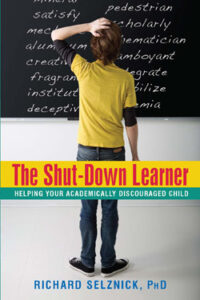 Over the last year or so, I’ve noted an interesting trend – I’ll call it the “Child-to-Mom- Sideways Glance.”
Over the last year or so, I’ve noted an interesting trend – I’ll call it the “Child-to-Mom- Sideways Glance.”
Here’s how it goes.
Take William, age 8, who comes in to meet with me for the first time accompanied by his mother. They sit next to each other perhaps two feet apart.
I engage William.
“So, Will, how old are you?”
Rather than answer the question directly, William immediate glances sideways at his mom before answering.
Once answering I check my chart and jokingly state, “Correct!!!! You’re right!!!!”
Thankfully, William laughs as I ask him another question.
“And, when’s your birthday? (Sideways glance comes again immediately before responding.)
Teasingly, I joke, “I’m going to ask another one. This is not a trick question. You’re not allowed to look at your mother – in fact, I’m going to put up this paper shield so you can’t look at her when you answer,” as I playfully put up a paper between them so he can’t look at her when I ask if he has any pets.
Now I have William fully laughing and his mother is too, because she knows she’s in this dance with him as a co-conspirator.
This segues into another kid, Nicholas, age 10, a budding and brilliant future neuroscientist (and not a sideways glancer).
I explain my observation to Nicholas looking for his opinion on child behavior.
“So, Nicholas, I’ve picked up on this trend of child behavior where kids can’t answer a question without looking at their moms. I know there is no right or wrong answer, but what’s your guess why this is happening?”
Without skipping a beat, Nicholas says, “I would have a few hypotheses.” (Now, I’m dying, laughing and leaning back, enjoying the ride to come.)
“My first hypothesis would be that the kid is maybe a little uncomfortable, maybe a little nervous.”
“That sounds like a good one,” I say. “And your second?”
“Another hypothesis would be the kid has become too reliant (his word) on his mother. A third would be that they’re looking to their mother for approval too much.”
“Wow…those are pretty good,” I affirm (not that he needs my affirmation). “I have one more to add,” I tell him.
“And, that would be?”
(Now I have pressure to earn my stripes with this 10-year-old researcher.)
“A hypothesis I would have would be the mom is too ready to speak for the child and he’s gotten very used to her answering for him.”
Nicholas gives me a wise nod, thankfully affirming my hypothesis. (I needed Nicholas’ approval more than he needed mine.)
I ask Nicholas how he would set up a study and test the hypotheses. Nicholas tells how he would set up a study to test them. Nicholas quickly explains how he would research it, a well-designed study worthy of most graduate programs.
Takeaway Point
All hypotheses are in play when it comes to the child-to-mother sideways glance.
This trend will need to be investigated further. Nicholas is on it.
I can’t wait to start having Nicholas on as a guest or co-host on my future podcasts.
(***Please note: All blogs represent the opinion and perspective of Dr. Richard Selznick. Comments and questions are welcomed, but are blocked by the hosting site. Please email questions or comments: rselznick615@gmail.com)
 Copyright, Richard Selznick, Ph.D. 2022, www.shutdownlearner.com.
Copyright, Richard Selznick, Ph.D. 2022, www.shutdownlearner.com.
To Contact Dr. Richard Selznick for advice, consultation or other information, email rselznick615@gmail.com.
To receive future blog posts, register your email: https://shutdownlearner.com.

 Last Sunday there was a feature article in the New York Times on the science of reading emphasizing that “science” has confirmed the need to teach children phonics. (
Last Sunday there was a feature article in the New York Times on the science of reading emphasizing that “science” has confirmed the need to teach children phonics. ( With the arrival of newborn Emmett Gaetano Selznick last weekend, an official new chapter begins in our lives.
With the arrival of newborn Emmett Gaetano Selznick last weekend, an official new chapter begins in our lives. “The world is passing through troublous times. The young people of today think nothing but of themselves. They have no reverence for parents or old age. They are impatient of all restraint. They talk as if they knew everything, and what passes for wisdom with us is foolishness with them. As for the girls, they are forward, immodest and unladylike in speech, behavior and dress.” (Peter the Hermit, circa 1250)
“The world is passing through troublous times. The young people of today think nothing but of themselves. They have no reverence for parents or old age. They are impatient of all restraint. They talk as if they knew everything, and what passes for wisdom with us is foolishness with them. As for the girls, they are forward, immodest and unladylike in speech, behavior and dress.” (Peter the Hermit, circa 1250)